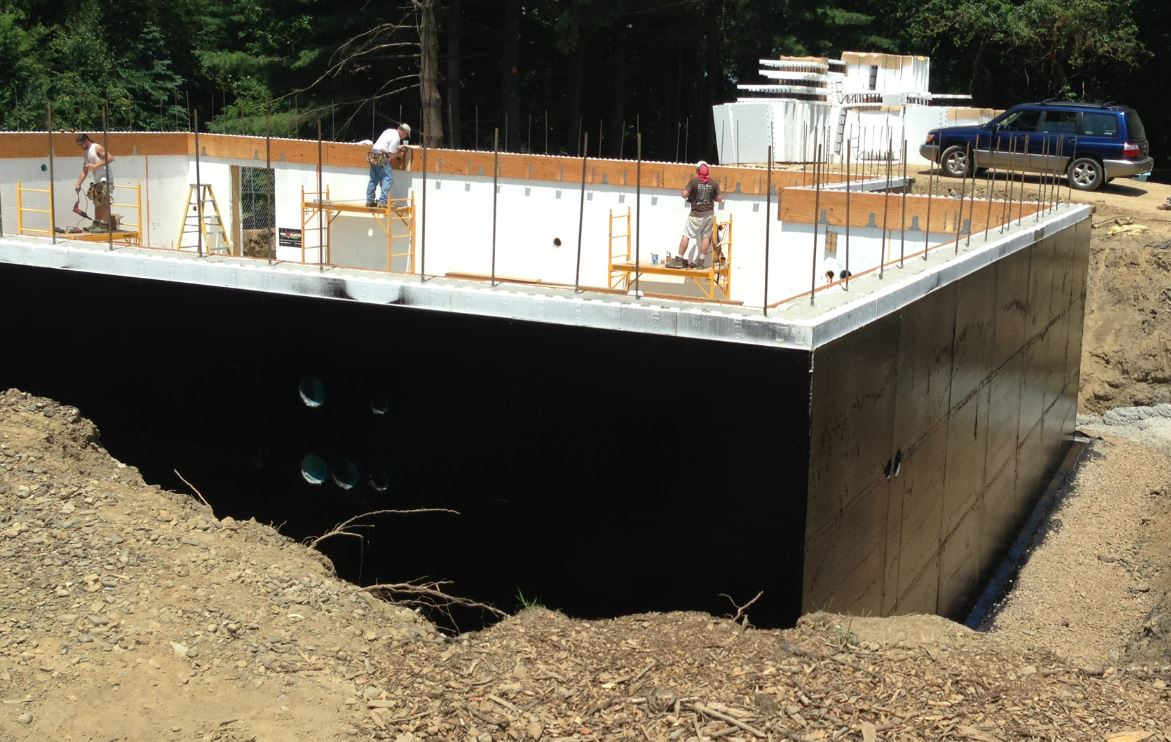
What Is the R-Value of ICF Foundation Walls?

What is R-value, really? The term R-value comes from a material’s ability to transfer heat through conduction. In conduction, one molecule is passing heat to another molecule next to it, and so on. When a material has a low R-value, heat and energy can travel quickly through it. High R-value materials are wonderful insulators because they do not move heat quickly.
Why Does R-Value Matter?
Now that we know what R-value is, why is it important? R-value matters when you want to keep one space at a different temperature than another space, like cooling down the inside of a building while it’s hot outside. Heat naturally wants to flow from areas of high temperature to areas of low temperature.

Since this is a natural phenomenon, we can’t stop it, but we can slow it down. Imagine a building that is poorly constructed with very little insulation. The air conditioner may run constantly on a hot day to try to keep it comfortable inside, but with little insulation in the walls, there is not much material to slow the heat down from flowing from outside back into the building.
High R-value materials can fix this problem. When a building's walls are constructed with better materials, like ICF blocks from Fox Blocks, less heat flows into or out of the building through the walls. One area where the R-value metric lacks real insight is that it doesn’t show how air tight a structure is. Think about it this way, if a building has excellent insulation with a really high R-value, but the insulation has sagged and there is an air leak through the wall, a ton of energy will be lost through the air leak and not the insulation.

What Makes ICFs So Great for Insulation?
Insulated concrete forms (ICF) serve a few main purposes: they provide strength and rigidity to a structure while blocking out the external environment, and they insulate the interior space from the exterior. Conventional construction methods rely on proper assembly which often results in gaps or leaks that reduce the effectiveness of the wall.
ICF blocks have both an inner and outer layer of continuous insulation that is preinstalled in the factory. Concrete is cast-in-place between the two layers of insulation to lock the wall in place. Cladding is then added to the outside and gypsum board is added to the inside. Efficiency is greatly improved by using the Fox Blocks’ system.
What makes ICF block construction better than traditional framing is, among many other things, the high R-value properties of ICF blocks. Many builders will talk about framed wall construction being R-13, R-21, or even higher. A common mistake that builders can make is referring to the R-value of the wall as being the R-value of the highest rated material in the wall, the insulation. For example, fiberglass insulation may have an R-21 rating but a 2x4 may be rated at R-5. That means the R-21 rated insulation will be broken up every 16 inches or so with a material that has just an R-5 rating. When you add in nails and fasteners, the R-value of the wall drops even faster. That’s why it is always important to look at a wall as an assembly and to know the composite R-value rating.

In addition to incredible R-value performance, ICF blocks are also highly effective air barriers. Unlike traditional wood framed structures, solid concrete blocks prevent passages for air to leak. Air leaks are just throwing money and energy away and can come even from good construction practices. In a wood-framed wall, materials can sag and sealants can break down over time. Even a wood-framed wall with virtually no air leaks during commissioning may be in much worse shape after just a few years. The ICF blocks’ high R-value and exceptional air barrier performance take those worries away.
What R-Value Can ICF Blocks Achieve?
By limiting thermal bridging and designing the entire wall assembly in a better-engineered way, ICF blocks can reach some of the highest economically achievable R-values on the market for their size. With a clear R-value of R-22 and whole wall calculations of R-24, Fox Blocks ICF walls are in the high performance category. When used in conjunction with other high energy efficiency techniques and products, energy efficient doors, windows, and roof insulation, Fox Blocks structures require 44% less energy to heat and 32% less energy to cool.

Better R-values, high performance design, and exceptional air barrier performance. What more could you want from a wall assembly? Fox Blocks ICF blocks provide all this and more at an economical price. To learn more about how Fox Blocks can help you achieve better performance in your next project, reach out to our ICF experts today.